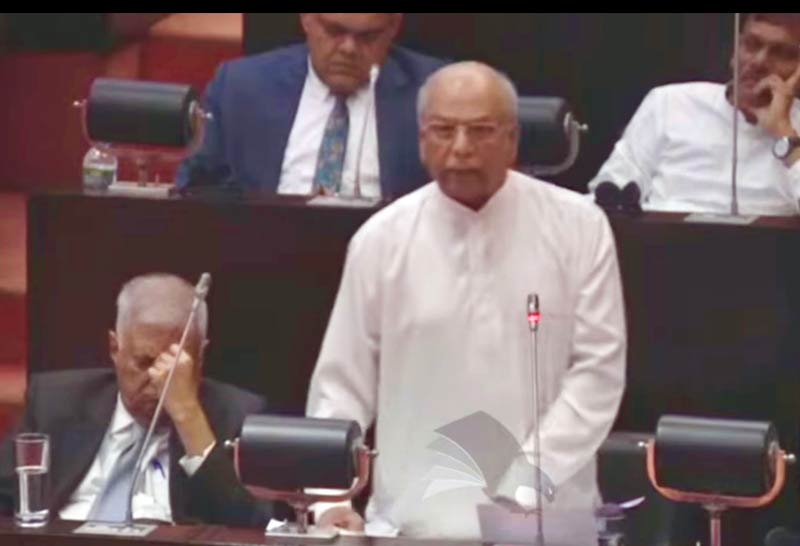Saturday Feb 21, 2026
Saturday Feb 21, 2026
Thursday, 7 March 2024 03:44 - - {{hitsCtrl.values.hits}}

Prime Minister Dinesh Gunawardane
Tensions ran high in Parliament yesterday as lawmakers engaged in a heated debate over the Central Bank's autonomy and recent salary hikes.
Prime Minister Dinesh Gunawardena revealed that the gross salary of the lowest-ranking employee at the Central Bank, an Office Assistant - Grade 1, has spiked by 29.53% to reach Rs. 188,827.
In response to a query by SJB MP S.M. Marikkar, the Premier disclosed in Parliament that the gross salary of the Deputy Governor has also witnessed a substantial surge of 76.97%, now standing at Rs. 1,728,419.
The Prime Minister underscored that Central Bank employees are not only beneficiaries of increased salaries but are also entitled to additional perks, including housing loans, vehicle loans, welfare loans, and medical facilities.
Giving a breakdown of the salary increments the Prime Minister revealed significant rises across various positions:
- Office Assistant Grade I: 29.53% increase to Rs. 188,827.33
- Office Assistant Grade II: 32% increase to Rs. 203,000
- Office Assistant Grade III: 35% increase to Rs. 223,763
- Assistant Manager Grade I: 38.9% increase to Rs. 241,623.83
- Assistant Manager Grade II: 41% increase to Rs. 262,992
- Assistant Manager Grade III: 45% increase to Rs. 298,359.33
- Assistant Manager Grade IV: 89% increase to Rs. 347,820
- Assistant Manager Grade V: 54% increase to Rs. 421,184
- Staff Officer I: 58.83% increase to Rs. 526,648
- SO II: 62% increase to Rs. 619,768
- SO III 1: 66.7% increase to Rs. 765,000
- SO III 2: 70.16% increase to Rs. 893,755.23
- SO IV: 73% increase to Rs. 1,049,430
- Assistant Governor: 76% increase to Rs. 1,167,170
- Deputy Governor: 76% increase to Rs. 1,728,419
When asked by the Chief Opposition Whip MP Lakshman Kiriella if the Government will reverse the CBSL salary hike, the Prime Minister said the Government is prepared to implement necessary changes pending the report from the Committee on Public Finance (CoPF).
However, lawmakers expressed concerns over the proportion of the salary hikes, citing them as excessive.
President Ranil Wickremesinghe cum Finance Minister present in Parliament proposed a debate following the submission of a report by the CoPF.
He stated that the focus of the debate is more on ousting CoPF Chairman Dr. Harsha de Silva rather than the Central Bank Governor.
CoPF Chairman and MP Dr. de Silva highlighted the unique position of the Central Bank, which can generate profits by printing money.
“It is the only entity that can show a profit by printing money, whereas other businesses need to either sell a product or service to make a profit,” he pointed out.
However, Dr. de Silva that the Central Bank Act clearly states that salary increases based solely on its profits are prohibited.
"While Parliament may not have full authority, there is still a certain level of power regarding how the Central Bank's profits should be utilised," he added.
Opposition leader Sajith Premadasa drew attention to the autonomy of the Election Commission, noting that despite having the authority to determine its members' salaries, they have not implemented increases as high as 70% seen in the Central Bank.
MP Weerasumana Weerasinghe held the Monetary Board of the Central Bank and the Finance Minister accountable for the decision.
State Minister MP Chamara Sampath Dassanayake asserted that neither the Government nor the opposition supports the Central Bank's actions, deeming the debate unnecessary without the CoPF's report.
Central Bank officials defended the increases, citing provisions under the Central Bank Acts 5, 8, and 23, which grant them the authority to cover all management expenses.
Despite the salary hikes, around 30% of the highest salaries will go to the Government as taxes.
The salary hike for Central Bank staff has sparked debates within Parliament, with some questioning the rationale behind the significant increments.